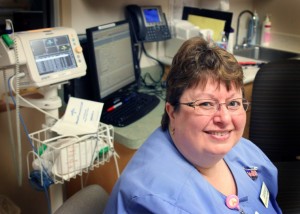 A triage nurse plays a very important role in emergency room settings where a patient’s condition is assessed and monitored. If you would like to work in nursing, but would prefer to be a specialist rather than a generalist, it is important to choose a specialty area that is high in-demand and that also interests you. Satisfaction in the workplace varies from setting to setting and title to title. Read on, and find out what exactly a nursing professional working in triage does on a daily basis.
A triage nurse plays a very important role in emergency room settings where a patient’s condition is assessed and monitored. If you would like to work in nursing, but would prefer to be a specialist rather than a generalist, it is important to choose a specialty area that is high in-demand and that also interests you. Satisfaction in the workplace varies from setting to setting and title to title. Read on, and find out what exactly a nursing professional working in triage does on a daily basis.
What is Role of Triage Nursing Professionals?
A nurse in the triage department is the first clinically trained medical professional that will sit with patients to evaluate their symptoms. They sit and note the patient’s chief complaints in their file and decide whether or not the patient is in danger and should be placed on the priority list. Nurses will take vital signs as soon as you are signed in, order specific tests based on standard orders that are in place, and monitor your status while the ER doctor is reviewing test results. Their primary goal is to care for all patients and to streamline the delivery of care so that patients can be admitted or discharged in a timely manner.
Where Do Triage Nurses Work?
You can work in a variety of emergency settings as an experienced and highly-trained triage nurse. You can either work in the front end of the department where you will speak with patients as they describe their symptoms or at the desk where ER doctors and nurses communicate.
If you would prefer not to be in a traditional setting, more and more healthcare facilities are hiring telephone triage nurses who help patients over the phone by answering their questions, assessing their symptoms, and advising them what type of care they will need. The purpose of the telephone nurse is to consult patients in an effort to refer them to either a emergency room or a clinic for urgent care treatment, according to Discover Nursing. While telephone nurses do not have to go from bed to bed, they are still in a fast-paced setting behind the scenes.
How to Become a Triage Nursing Specialist
The first step to working in triage is to complete a nursing degree program with an accredited school that has a good reputation for preparing nurses. Once you complete your formal degree program, you can then sit for the NCLEX-RN licensing exam to earn your RN license so that you can practice in a variety of settings. Simply being an RN will qualify you for the triage title, but having a certification can get you more attention. There is not a specific triage nursing certification, but becoming a Ambulatory Care Nurse can help show you are a specialist in emergency care. This certification is available through the American Academy of Ambulatory Care Nursing and requires candidates to have at least 2000 hours of clinical experience.
Related Resource: Nurse Administrator
The demand for nurses working in telephone and traditional triage departments is on the rise. With more of the population gaining access to healthcare, demand is only projected to rise. While it can be a stressful setting to work in, it will be a fulfilling experience to work with patients who are ill or injured. Train to become a triage nurse and become the first medical staff member to ask probing questions and determine what is wrong.



